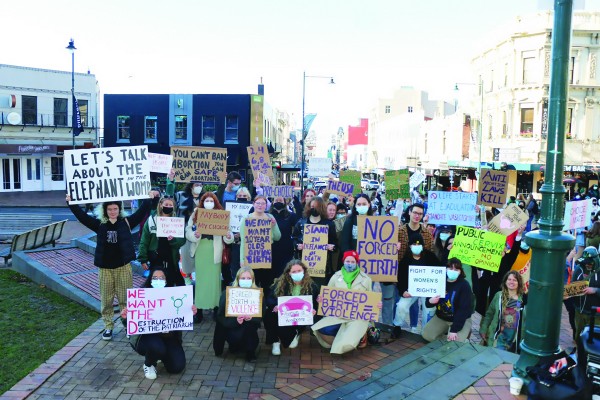Last Saturday, almost 200 Otago Uni students organised a peaceful sit-in at the lower Octagon to protest the overturning of Roe v Wade. The hour-long protest included speeches, music and (of course) TikToks.
On June 25, the United States Supreme Court announced the overturning of Roe v Wade, a nearly 50-year old legal precedent which had upheld the right to abortion as a fundamental constitutional right across the US. The decision sent shockwaves across the world, including in Aotearoa, where abortion was only legalised two years ago (through the Abortion Legislation Bill 2020).
Georgia, one of the organisers, spoke at the sit-in. She said: “If the government had their way, I would have been a 19-year-old raising a child to a rapist. I am standing here today, not only to support my fellow Americans with uteruses but also to make a statement; I am here to be loud and unapologetic. I am forming a life for myself and I will choose how my life goes. I will not let another scared 19-year-old, taking a pregnancy test in a New World bathroom, feel scared that she would have to raise a child.”
Rachael, another international student at Otago University, condemned the unequal standards of reproductive and sexual healthcare that international students receive. International students on student visas are ineligible for Government-funded healthcare. Instead, they must fork out for private insurance (the Uni’s recommended “Studentsafe” programme comes in at a cool $700 per year), and then must usually pay substantial amounts on top of that. “Not too long ago I needed to get my own IUD replaced; I was quoted a cost of $700,” said Rachael, to which someone in the crowd responded, “What the fuck?!” Getting an abortion, she said, could cost as much as $3,000. To put it into perspective, that’s like 150 boxes, or around five months of rent.
Amelia Hamilton, director of Thursdays in Black Otago, spoke at the sit-in to highlight the intersection between sexual violence and reproductive freedom. Amelia drew parallels between unconsensual sexual interactions and “forcing a survivor to carry out an unwanted pregnancy”. She said that “to stand in solidarity with survivors is to unequivocally stand in support of consent in all situations including carrying out a pregnancy.”
Students at the protest seemed firmly focused on the future: keen to show that any attempt to change abortion laws in Aotearoa would not be welcomed. Jessica told Critic Te Arohi that “We have to come to pre-emptively reiterate that we wouldn’t stand for [changes to abortion laws].” Sage told us that “We don’t want abortion laws to follow the same path as in the United States.” Alisha, a Polytech student and member of the Student Christian Movement, told Critic Te Arohi that Roe v Wade “happened because of The Church… As a Christian, we are responsible for having these conversations.”
Georgia also encouraged students to “look into who you’re voting for and be politically active”. All parties currently in Parliament (ACT, Green, Māori, Labour and National) are officially pro-choice. However, there are certain snags: 9 Labour MPs, including Foreign Minister Nanaia Mahuta, voted “no” to the Abortion Legalisation Bill 2020. While National Party leader Chris Luxon has committed to “not changing” abortion laws if they were to regain power, most of their current caucus voted “no” in 2020, and many National MPs have publicly expressed anti-abortion views, including Luxon himself. While the only parties publicly advocating criminalising abortion are the tiny, hard-right New Conservative and Vision parties, the prospect of them gaining enough influence to change public policy is no longer an impossible one.






